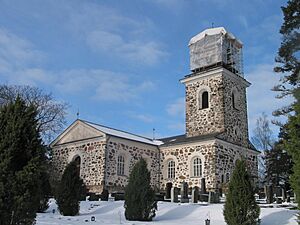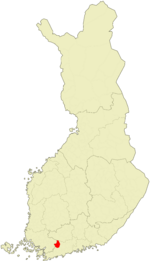Nummi-Pusula facts for kids
Quick facts for kids
Nummi-Pusula
|
||
|---|---|---|
|
Former municipality
|
||
| Nummi-Pusulan kunta Nummis-Pusala kommun |
||

Nummi Church
|
||
|
||

Location of Nummi-Pusula in Finland
|
||
| Country | Finland | |
| Region | Uusimaa | |
| Sub-region | Helsinki sub-region (formerly Lohja sub-region) | |
| Charter | 1981 | |
| Seat | Nummi | |
| Area | ||
| • Total | 505.13 km2 (195.03 sq mi) | |
| • Land | 468.33 km2 (180.82 sq mi) | |
| • Water | 36.8 km2 (14.2 sq mi) | |
| Population
(31 December 2012)
|
||
| • Total | 6,175 | |
| • Density | 12.2246/km2 (31.6615/sq mi) | |
| Time zone | UTC+2 (EET) | |
| • Summer (DST) | UTC+3 (EEST) | |
| Climate | Dfb | |
| Website | www.nummi-pusula.fi | |
Nummi-Pusula was a place in Finland that used to be its own local government area, called a municipality. Its main town was Nummi. Nummi-Pusula was created in 1981 when two older municipalities, Nummi and Pusula, joined together.
On January 1, 2013, Nummi-Pusula became part of the larger town of Lohja. This happened at the same time as another municipality, Karjalohja, also joined Lohja.
Contents
Where Was Nummi-Pusula Located?
Nummi-Pusula was in the southern part of Finland. It was part of the Uusimaa region. This region is known for its beautiful nature.
The area of Nummi-Pusula was about 505 square kilometers. A small part of this area, about 36.8 square kilometers, was water. In 2012, about 6,175 people lived there.
Language Spoken in Nummi-Pusula
The people in Nummi-Pusula spoke only one official language. This language was Finnish. This means all public services and signs were in Finnish.
Villages of Nummi-Pusula
Before Nummi-Pusula joined Lohja in 2013, it was made up of many smaller communities. These communities are called villages. They were divided into two main sections: Nummi and Pusula.
Villages in the Nummi Section
|
|
|
|
Villages in the Pusula Section
|
|
|
Friendship with Other Towns
Nummi-Pusula had a special friendship with another town. This is called "twinning." Since 2004, Nummi-Pusula was twinned with Abja Parish in Estonia. This means they shared culture and ideas.


